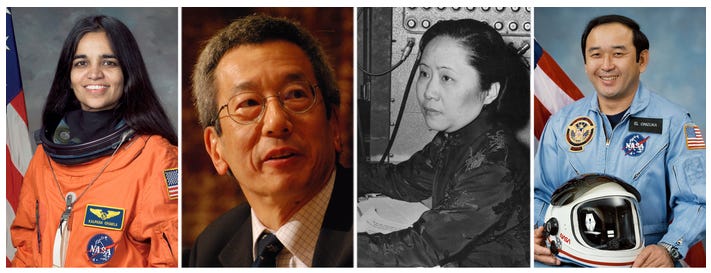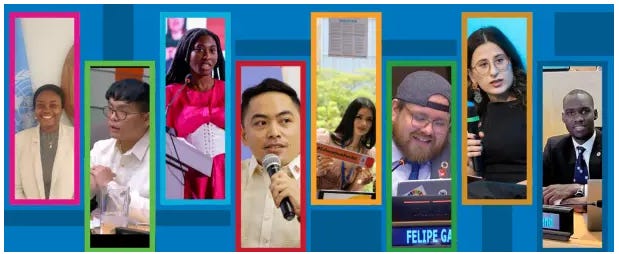Breaking Into the Field of Informal STEM Learning Program Evaluation
Welcome to Insights & Opportunities: A Hub for Informal STEM Education! Insights & Opportunities is a twice-monthly newsletter for educators, administrators, legislators, and advocates who recognize the importance of informal STEM learning.
This newsletter is brought to you by me, Sarah Dunifon, and my team at Improved Insights. I’m a long-time STEM educator, researcher, and equity advocate. Along with my team, I now work on cutting-edge informal STEM learning research and evaluation.
Each edition of this newsletter offers exciting insights, resources, and opportunities for informal STEM learning professionals, including funding, jobs, professional development, informal STEM learning research, evaluation tips and resources, and so much more! We hope you find it valuable. Now, let’s get started.
Breaking Into the Field of Informal STEM Learning Program Evaluation
Our last article profiled a month in the life of an informal STEM education program evaluator. In this post, we’ll answer some questions about how to break into the field. I get a lot of questions from students and early career professionals about pathways into the industry. I’ve also had conversations (once over Chicago-style pizza, yum) with mid-career professionals looking to transition to informal STEM learning and/or program evaluation. The following is some advice on what I’ve seen work and strategies you might employ to break into - or transition into - informal STEM learning program evaluation.
How do people find their way into ISE program evaluation roles?
There are two main ways that folks seem to find themselves in ISE program evaluation: (1) by pursuing an academic career in the subject (i.e., obtaining a master’s degree or doctoral degree) then looking for a job, or (2) by finding an entry-level role in informal STEM learning organization and building evaluation skills on the job. Certainly, folks have pursued both tracks (myself included!) as well. Both approaches are valid and valuable strategies.
To read the full article, check it out in our Insights.
60-Second Suggestions
Here are a few of our favorite things this month, usually pertaining to informal STEM education and evaluation, but occasionally some fun personal stuff, too.
May is AAPI Heritage Month! This article from Science Buddies highlights 18 influential Asian American and Native Hawaiian/Pacific Islander scientists and engineers who have made significant contributions to STEM. The article also includes links to fun experiments and information on careers related to each individual on the list.
We wanted to highlight two valuable resources for ISE supporters on engaging in advocacy for afterschool and informal education. The Afterschool Alliance has created this landing page with toolkits, resources, and multiple pathways on how you can effectively support afterschool programming at federal, state, and local levels. The American Alliance of Museums (AAM) will also host a free webinar on May 29, 2025, at 2:00 PM ET focused on engagement at the state and federal levels for museum advocacy and how to prepare for conversations with representatives.
UNESCO is currently seeking young people ages 16-30 to join the SDG4 Youth & Student Network. The Network is dedicated to empowering youth and students to contribute to educational policy, advocacy, and innovation. Members will play an active role in advancing global education objectives through participation in consultations, campaigns, and working groups. Applications are open through July 10, 2025.
Opportunities
Check out these new opportunities for the informal STEM learning community.
Funding:
2025 Grant Cycle, The Samuel Roberts Noble Foundation, variable. Oklahoma nonprofits are invited to submit for funding to expand educational opportunities, build stronger communities, and cultivate good health. Applications are due June 1, 2025.
Early Childhood Education and Play, Caplan Foundation for Early Childhood, variable. Grants will be awarded to nonprofit organizations in support of programs aimed at improving the quality of early childhood education everywhere a child learns through innovative curricula and designing imaginative play materials and learning environments. Letters of inquiry are due May 31, 2025.
Rapid Response Bridge Funding Program, Spencer Foundation, $25,000. Those who have been affected by recent shifts in federal funding for education research, including large-scale terminations of National Science Foundation (NSF) research grant awards, are invited to apply for bridge funding. This funding is meant to support scholars and teams whose grants have recently been cancelled by NSF. To be eligible, scholars must: (1) be working on research on STEM and education (including AI and CS, graduate education and MSIs, and scholarship that aims to reduce inequality), and (2) have had a recently terminated or cancelled grant from NSF. Proposals are due May 30, 2025.
Student STEM Enrichment Program (SSEP), Burroughs Wellcome Fund, up to $60,000. Nonprofit organizations, including public and private schools, colleges and universities, and community groups in North Carolina are invited to apply for grants in support of diverse programs that enable K-12 students to participate in creative, hands-on STEM activities. Programs must employ inquiry-based avenues of exploration. Applications are due June 9, 2025.
Jobs and Fellowships:
Director of Education and Interpretation, Bernheim Forest & Arboretum (Clermont, KY), $65,000. The Director of Education and Interpretation will lead and support the Education staff in the development and implementation of an innovative, integrated program of ecological education for Bernheim visitors and surrounding communities. They will supervise permanent and seasonal staff and education volunteers, adapt and improve educational materials and programs, and cultivate ongoing community relationships.
Education Coordinator - Zoo Education Outreach, Henry Vilas Zoo (Madison, WI), $34.00/hour. The Education Coordinator will assist in managing the Zoo's Education program, support the implementation of conservation and education programs, and support initiatives to enhance community engagement. This includes building, maintaining, and overseeing education programs, development, revision, and evaluation of curriculum, and associated staff training.
Museum Education Coordinator, University of Kansas Natural History Museum (Lawrence, KS), $51,000. The Museum Education coordinator will implement a range of science education programs and resources. They will be responsible for teaching, program research and development, and program implementation and administration, including curriculum development and program evaluation. Applications are due June 8, 2025.
Program Manager - Education and Outreach, NEIWPCC (Grand Isle, VT), $80,000. The Program Manager of Education and Outreach will lead and expand education outreach efforts to connect diverse audiences with the Lake Champlain watershed as part of the Lake Champlain Basin Program (LCBP) team. They will be responsible for developing, implementing, and evaluating education and outreach programs.
Tide to Land Education Apprentice (Part-Time), Ocean Hour Farm (Newport, RI), $22.00/hour. The Tide to Land Education Apprentice will shadow staff members in livestock management, crop production, and ecological monitoring, and work alongside the Education Program Associate to design, plan, and facilitate Ocean Hour Farm's summer camp education programs for K-12 youth. This position is part-time (approximately 30 hours/week).
Professional Development:
37th Annual Visitor Studies Association Conference, Visitors Studies Association, July 15-17, 2025 (Virtual). The Visitor Studies Association (VSA) will host their 37th Annual Visitor Studies Association Conference virtually from July 15-17, 2025. The conference will focus on building expertise for effective evaluation, collaboration to build further rigor in advocacy, and examples of how visitor studies are used by leadership, among other topics.
2025 Conference for Advancing Participatory Sciences, Association for Advancing Participatory Sciences (AAPS), May 27-30, 2025 (Portland, OR). The 2025 Conference for Advancing Participatory Sciences will feature keynote presentations, panel-style symposia, workshops, and field trips on several themes related to participatory sciences, including technology-driven innovation, diversity and inclusion, education and learning, and ethical considerations, among others.
2025 Summer Institute for Climate Change Education, Teach Climate Network, July 14-17, 2025 (Virtual). The Summer Institute for Climate Change Education invites both formal and informal educators to join for a three-day climate change education conference July 14-17, 2025. The Institute will explore the themes of: Understanding and Observing Climate Change, Education for Justice, Educators as Change Makers & Champions, and Climate Change Education Policy, among others.
Dialogue & Deliberation Interactive Workshop, Association of Science and Technology Centers (ASTC), June 16, 2025, at 2:30 PM ET (Virtual). Join ASTC for an interactive webinar focused on designing and facilitating conversations that help community groups identify or refine their priorities and make decisions about important issues at the intersection of science, society, and policy. Presenters will share stories of successful Dialogue & Deliberation events at museums, review best practices for designing events, and provide time for participants to brainstorm in small groups. The virtual workshop will be held on June 16, 2025, at 2:30 PM ET.
Thanks for tuning in to this edition of Insights and Opportunities. While you’re waiting for the next edition, tell your friends! We appreciate you sending along a blog post you enjoyed, a job opportunity you think a friend should apply for, and resources you found valuable. Sharing this newsletter is the best way to support this work. Until next time - thanks!










